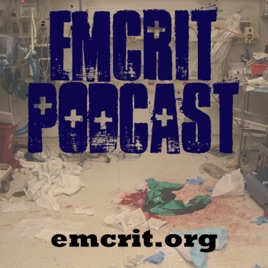
Advertise on podcast: Behind The Knife: The Surgery Podcast
Rating
4.8 from
Country
This podcast has
500 episodes
Language
Publisher
Explicit
No
Date created
2015/03/29
Average duration
31 min.
Release period
4 days
Description
Behind the Knife is the world’s #1 surgery podcast. From high-yield educational topics to interviews with leaders in the field, Behind the Knife delivers the information you need to know. Tune in for timely, relevant, and engaging content designed to help you DOMINATE THE DAY! Behind the Knife is more than a podcast. Visit http://www.behindtheknife.org to learn more.
Podcast episodes
Check latest episodes from Behind The Knife: The Surgery Podcast podcast
In-Flight Emergencies
2024/02/26
Do the words “Is there a doctor on board” fill you with anxiety? For Dr. Thomas Doyle, responding to in flight medical events is just another day at the office. As the medical director for STAT-MD, him and his team provide on the ground consultation for passengers experiencing medical events at 35,000 feet. In this episode we talk about what events are most common, what equipment is on board, what are the rules/regulations around providing medical assistance, and what ground consultation services like STAT-MD can help offer to you so you’re never alone if you hear that phrase “Is there a doctor on board?”
Guests:
Thomas J. Doyle, MD, MPH- Clinical Associate Professor of Emergency Medicine- University of Pittsburgh Medical Center; Medical Director, STAT-MD
Jessica Millar, MD- General Surgery Resident- University of Michigan; Education Fellow- Behind the Knife
Major John McClellan, MD- Acute Care and Trauma Surgeon- University of North Carolina Chapel Hill
Want to learn more from Dr. Doyle about in-flight medical events- you can check out one of his previous lectures here: https://www.upmcphysicianresources.com/cme-courses/emergencies-at-35000-feet-is-there-a-medical-provider-on-board
**Introducing Behind the Knife's Trauma Surgery Video Atlas - https://app.behindtheknife.org/premium/trauma-surgery-video-atlas/show-content
The Trauma Surgery Video Atlas contains 24 scenarios that include never-before-seen high-definition operative footage, rich, original illustrations, and practical, easy-to-read pearls that will help you dominate the most difficult trauma scenarios.
***Fellowship Application - https://forms.gle/5fbYJ1JXv3ijpgCq9***
Please visit https://behindtheknife.org to access other high-yield surgical education podcasts, videos and more.
If you liked this episode, check out more recent episodes here: https://app.behindtheknife.org/listen
more
Journal Review in Colorectal Surgery: Anal Dysplasia and Anal Squamous Cell Carcinoma
2024/02/22
You have a patient referred to you for a history of anal dysplasia and found to have an anal lesion on colonoscopy. How do you evaluate this? What are the risk factors? How will you perform surveillance afterwards? Does everyone need HRA? Tune in to find out!
Join Drs. Peter Marcello, Jonathan Abelson, Tess Aulet and special guest Dr. Lisa Breen as they discuss high yield papers discussing Anal Dysplasia.
Learning Objectives
1. Describe the different types of anal dysplasia and pathologic categorization
2. Describe high risk populations for development of anal squamous cell cancer
3. Discuss the different options and recommendations for surveillance and treatment of anal dysplasia
Video Link: https://www.youtube.com/watch?v=YdOjV1Gcqvk
**Introducing Behind the Knife's Trauma Surgery Video Atlas - https://app.behindtheknife.org/premium/trauma-surgery-video-atlas/show-content
The Trauma Surgery Video Atlas contains 24 scenarios that include never-before-seen high-definition operative footage, rich, original illustrations, and practical, easy-to-read pearls that will help you dominate the most difficult trauma scenarios.
***Fellowship Application - https://forms.gle/5fbYJ1JXv3ijpgCq9***
Please visit https://behindtheknife.org to access other high-yield surgical education podcasts, videos and more.
If you liked this episode, check out more recent episodes here: https://app.behindtheknife.org/listen
more
Clinical Challenges in Bariatric Surgery: Internal Hernia
2024/02/19
You get called to see a consult in the middle of the night. It is a middle-aged woman with a bariatric history, and she says her stomach is smaller but doesn’t know the name of the operation. She developed worsening abdominal pain after dinner and it’s been getting worse. She’s not peritonitic, but she’s clearly in discomfort. Is it cholecystitis, diverticulitis, pancreatitis, marginal ulcer, or an internal hernia? What do you do? Join Drs. Matthew Martin, Adrian Dan, and Paul Wisniowski on a discussion about initial evaluation and management of bariatric patients with internal hernias.
Show Hosts:
Matthew Martin
Adrian Dan
Paul Wisniowski
Show Notes
1. Initial Evaluation
a. Focused history and physical, labs, and imaging
i. Presenting symptoms may vary and include: nausea, emesis, and abdominal pain ranging from vague to severe.
ii. A basic lab panel can aid in developing the diagnosis and guide resuscitation.
iii. CT of the abdomen and pelvis with IV and oral contrast can assist in identifying intra-abdominal pathology
iv. Reviewing the previous operative report is beneficial to have a framework of the anatomy, i.e. type of bariatric surgery, and configuration of small bowel limbs (ante- vs retro-gastric and ante- vs retro-colic).
1. According to a 2019 study, 40-60% of closed defects had reopened at time of re-exploration
v. If the patient is peritonitic with abdominal pain, they should be treated similarly to any patient with an acute abdomen with emergent exploration.
b. CT Imaging
i. A mesenteric swirl sign with twisting of the soft tissue and mesenteric vessels with surrounding fat attenuation has been shown to have a sensitivity of 78-100% and specificity of 80-90%. Other findings include: a Bird’s beak, dilation of roux or biliopancreatic limbs, SMV narrowing, and displacement of JJ limb to the RUQ and can be used to support the diagnosis of internal hernia
ii. An experienced radiologist familiar with bariatric anatomy has been shown to have a positive predictive value to 81% and negative predictive value to 96% at radiologically diagnosing internal hernia.
iii. A CT scan can provide insight for a suspected diagnosis but it cannot rule out internal hernia
c. Nasogastric/Esophageal Tube
i. Use judiciously based on patient’s presenting symptoms
ii. Placement should be done by the surgical team
iii. This may mitigate the risk of aspiration during intubation.
2. Operative Management
a. Entry should be dependent on the comfort of the operating surgeon.
i. Veress entry into the abdomen with dilated bowels may lead to increased injuries.
ii. Optiview allows for direct visualization of each layer of the abdominal wall. Focusing on twisting the trochar and limiting perpendicular pressure.
iii. Hasson entry also allows for direct visualization but may be limiting in bariatric patients with thick abdominal walls
b. Exploration – a systematic approach
i. Start with evaluation of the gastric pouch and run the rou
more
Clinical Challenges in Cardiac Surgery: Mitral Valve Disease
2024/02/15
We know cardiac surgery can seem a bit daunting on the surface. However, most surgeons will come across cardiac surgery patients at some point whether in the OR, ICU, ED, etc. As the FIRST cardiac surgery specialty team for Behind the Knife, we are excited to bring you episodes focused on high-yield topics to help you navigate common cardiac surgery challenges, discuss relevant literature to help you in practice, and help our listeners feel more comfortable around cardiac surgery patients.
In this episode we’ll discuss mitral valve disease. We’ll review important physiologic differences in patients with mitral valve disease, the most common surgical approaches to address mitral valve disease, and how to work up and address acute mitral regurgitation due to acute papillary muscle rupture.
Hosts:
- Jessica Millar, MD- PGY-5 General Surgery Resident, University of Michigan, @Jess_Millar15
- Aaron William, MD- Cardiothoracic Surgery Fellow, Duke University, @AMWilliamsMD
- Nick Teman, MD- Assistant Professor of Thoracic and Cardiovascular Surgery, University of Virginia, @nickteman
Learning objectives:
- Understand the physiologic differences that occur with mitral valve stenosis and regurgitation.
- Understand the basic principles of mitral valve repair and replacement strategies.
- Understand the presentation, work-up, and acute management of acute mitral valve regurgitations due to acute papillary muscle rupture/MI.
For episode ideas/suggestions/feedback feel free to email Jessica Millar at: millarje@med.umich.edu
**Introducing Behind the Knife's Trauma Surgery Video Atlas - https://app.behindtheknife.org/premium/trauma-surgery-video-atlas/show-content
The Trauma Surgery Video Atlas contains 24 scenarios that include never-before-seen high-definition operative footage, rich, original illustrations, and practical, easy-to-read pearls that will help you dominate the most difficult trauma scenarios.
more
Behind the Knife Cardiothoracic Oral Board Review - Sample Episode 2 - Patent Ductus Arteriosus
2024/02/12
Our Cardiothoracic Oral Board Audio Review includes 43 high-yield scenarios designed for Cardiothoracic Surgeons by Cardiothoracic Surgeons.
Scenarios are 5 to 7 minutes long and include a variety of tactics and styles. If you are able to achieve this level of performance in your preparation you are sure to pass the oral exam with flying colors. The second part introduces high-yield commentary to each scenario. This commentary includes tips and tricks to help you dominate the most challenging scenarios in addition to practical, easy-to-understand teaching that covers the most confusing topics we face as cardiothoracic surgeons. We are confident you will find this unique, dual format approach a highly effective way to prepare for the test.
Learn more about the course and see all the episode topics here: https://app.behindtheknife.org/premium/cardiothoracic-surgery-oral-board-audio-review
Please visit https://behindtheknife.org to access other high-yield surgical education podcasts, videos and more.
more
Behind the Knife Cardiothoracic Oral Board Review - Sample Episode 1 - Hemoptysis and Infectious Lung Disease
2024/02/08
Our Cardiothoracic Oral Board Audio Review includes 43 high-yield scenarios designed for Cardiothoracic Surgeons by Cardiothoracic Surgeons.
Scenarios are 5 to 7 minutes long and include a variety of tactics and styles. If you are able to achieve this level of performance in your preparation you are sure to pass the oral exam with flying colors. The second part introduces high-yield commentary to each scenario. This commentary includes tips and tricks to help you dominate the most challenging scenarios in addition to practical, easy-to-understand teaching that covers the most confusing topics we face as cardiothoracic surgeons. We are confident you will find this unique, dual format approach a highly effective way to prepare for the test.
Learn more about the course and see all the episode topics here: https://app.behindtheknife.org/premium/cardiothoracic-surgery-oral-board-audio-review
Please visit https://behindtheknife.org to access other high-yield surgical education podcasts, videos and more.
more
UK-REBOA Trial with Dr. Karim Brohi
2024/02/05
REBOA is one spicy meatball! On this episode, Drs. Nina Clark and Patrick Georgoff discuss the landmark UK-REBOA trial with Dr. Karim Brohi. This is the first randomized controlled trial studying REBOA and provides invaluable information about its potential indications.
Dr. Karim Brohi is a trauma and vascular surgeon at the Royal London Major Trauma Centre and director of the London Major Trauma System, which is the largest integrated urban trauma system in the world and manages over 33,000 injuries a year. He studied at University College of London where he obtained degrees in both computer science and medicine. Dr. Brohi went on to train in general surgery, vascular surgery, and anesthesia/critical care in the UK and trauma surgery in Cape Town and San Francisco. He is a prolific researcher and has led multiple large clinical trials.
Link to UK-REBOA paper: https://jamanetwork.com/journals/jama/article-abstract/2810757
BIG T Trauma episode 290 covers potential indications, placement, and complications of REBOA: https://behindtheknife.org/podcast/big-t-trauma-series-ep-2-reboa/
***TRAUMA SURGERY VIDEO ATLAS: https://app.behindtheknife.org/premium/trauma-surgery-video-atlas
***Fellowship Application - https://forms.gle/5fbYJ1JXv3ijpgCq9***
Please visit https://behindtheknife.org to access other high-yield surgical education podcasts, videos and more.
If you liked this episode, check out our recent episodes here: https://app.behindtheknife.org/listen
more
Clinical Challenges in Hepatobiliary Surgery: Bilateral Colorectal Liver Metastasis
2024/02/01
Surgical resection of bilateral colorectal liver metastasis (CLM) can pose a significant challenge to even the most experienced HPB surgeon. Is surgical resection justified, if so, in which patients? What’s the best surgical approach for curative intent resection of all lesions, and does ablation play a role? In this episode from the HPB team at Behind the Knife, listen in on the discussion about the surgical management of patients with bilateral colorectal liver metastasis.
Hosts
Anish J. Jain MD (@anishjayjain) is a T32 Research Fellow at the University of Texas MD Anderson Cancer Center within the Department of Surgical Oncology.
Timothy E. Newhook MD, FACS (@timnewhook19) is an Assistant Professor within the Department of Surgical Oncology. He is also the associate program director of the HPB fellowship at the University of Texas MD Anderson Cancer Center.
Jean-Nicolas Vauthey MD, FACS (@VautheyMD) is Professor of Surgery and Chief of the HPB Section, as well as the Dallas/Fort Worth Living Legend Chair of Cancer Research in the Department of Surgical Oncology at The University of Texas MD Anderson Cancer Center
Learning Objectives:
· Develop an understanding of patient selection for surgical resection of bilateral colorectal liver metastasis (CLM).
· Develop an understanding of the use of Two Stage Hepatectomy (TSH) versus Parenchymal Sparing Hepatectomy (PSH) in the treatment of bilateral CLM.
· Develop an understanding of if and when to use ablative procedures for resection of bilateral CLM.
· Develop an understanding of selection and management of patients who suffer recurrence after resection of bilateral CLM.
Suggested Readings
· Omichi K, Shindoh J, Cloyd JM, Mizuno T, Chun YS, Conrad C, Aloia TA, Tzeng CD, Vauthey JN. Liver resection is justified for patients with bilateral multiple colorectal liver metastases: A propensity-score-matched analysis. Eur J Surg Oncol. 2018 Jan;44(1):122-129. doi: 10.1016/j.ejso.2017.11.006. Epub 2017 Nov 24. PMID: 29208318; PMCID: PMC5742306.
https://pubmed.ncbi.nlm.nih.gov/29208318/
· Kawaguchi Y, Kopetz S, Tran Cao HS, Panettieri E, De Bellis M, Nishioka Y, Hwang H, Wang X, Tzeng CD, Chun YS, Aloia TA, Hasegawa K, Guglielmi A, Giuliante F, Vauthey JN. Contour prognostic model for predicting survival after resection of colorectal liver metastases: development and multicentre validation study using largest diameter and number of metastases with RAS mutation status. Br J Surg. 2021 Aug 19;108(8):968-975. doi: 10.1093/bjs/znab086. PMID: 33829254; PMCID: PMC8378514.
https://pubmed.ncbi.nlm.nih.gov/33829254/
· Nishioka Y, Paez-Arango N, Boettcher FO, Kawaguchi Y, Newhook TE, Chun YS, Tzeng CD, Tran Cao HS, Lee JE, Vreeland TJ, Vauthey JN. Neither Surgical Margin Status nor Somatic Mutation Predicts Local Recurrence After R0-intent Resection for Colorectal Liver Metastases. J Gastrointest Surg. 2022 Apr;26(4):791-801. doi: 10.1007/s11605-021-05173-0. Epub 2021 Nov 1. PMID: 34725784.
https://pubmed.ncbi.nlm.nih.gov/34725784/
· Passot G, Chun YS, Kopetz SE, Zorzi D, Brudvik KW, Kim BJ, Conrad C, Aloia TA, Vauthey JN. Predictors of Safety and Efficacy of 2-Stage Hepatectomy for Bilateral Colorectal Liver Metastases. J Am Coll Surg. 2016 Jul;223(1):99-108. doi: 10.1016/j.jamcollsurg.2015.12.057. Epub 2016 Jan 18. PMID: 26968325; PMCID: PMC4925205.
https://pubmed.ncbi.nlm.nih.gov/26968325/
· Donadon M, Cescon M, Cucchetti A, Cimino M, Costa G, Pesi B, Ercolani G, Pinna AD, Torzilli G. Parenchymal-Sparing Surgery for the Surgical Treatment of Multiple Colorectal Liver Metastases Is a Safer Approach than Major Hepatectomy Not Impairing Patients' Prognosis: A Bi-Institutional Propensity Score-Matched Analysis. Dig Surg. 2018;35(4):342-349. doi: 10.1159/000479336. Epub 2017 Oct 14. PMID: 29032372.
https://pubmed.ncbi.nlm.nih.gov/29032372/
· Lillemoe HA, Kawaguchi Y, Passot G, Karagkounis G, Si
more
Journal Review in Surgical Palliative Care: RCTs in Surgical Palliative Care
2024/01/29
2023 was an exciting year for Surgical Palliative Care research! Join Drs. Katie O’Connell, Ali Haruta, Lindsay Dickerson, and Virginia Wang from the University of Washington to discuss two seminal randomized controlled trials in the Surgical Palliative Care space.
Hosts:
· Dr. Katie O’Connell (@katmo15) is an Assistant Professor of Surgery at the University of Washington. She is a trauma surgeon, palliative care physician, Director of Surgical Palliative Care, and founder of the Advance Care Planning for Surgery clinic at Harborview Medical Center, Seattle, WA.
· Dr. Ali Haruta is a PGY7 Hospice & Palliative Care fellow at the University of Washington, formerly a UW General Surgery resident and Parkland Trauma/Critical Care fellow.
· Dr. Lindsay Dickerson (@lindsdickerson1) is a PGY5 General Surgery resident and current Surgical Oncology fellow at the University of Washington.
· Dr. Virginia Wang is a PGY2 General Surgery resident at the University of Washington.
Learning Objectives:
· Discuss the current state of the RCT literature in Palliative Care & Surgical Palliative Care
· Understand the primary outcomes of the Shinall and Aslakson trials as related to perioperative specialty palliative care intervention
· Identify limitations in existing surgical palliative care RCTs & further opportunities for study
· Identify underlying differences between medical oncology and surgical oncology patient populations
References:
1. Shinall MC, Martin SF, Karlekar M, et al. Effects of Specialist Palliative Care for Patients Undergoing Major Abdominal Surgery for Cancer: A Randomized Clinical Trial. JAMA Surg. 2023;158(7):747–755. doi:10.1001/jamasurg.2023.1396
https://pubmed.ncbi.nlm.nih.gov/37163249/
2. Aslakson RA, Rickerson E, Fahy B, et al. Effect of Perioperative Palliative Care on Health-Related Quality of Life Among Patients Undergoing Surgery for Cancer: A Randomized Clinical Trial. JAMA Netw Open. 2023;6(5):e2314660. doi:10.1001/jamanetworkopen.2023.14660
https://pubmed.ncbi.nlm.nih.gov/37256623/
3. Ingersoll LT, Alexander SC, Priest J, et al. Racial/ethnic differences in prognosis communication during initial inpatient palliative care consultations among people with advanced cancer. Patient Educ Couns. 2019;102(6):1098-1103. doi:10.1016/j.pec.2019.01.002
https://pubmed.ncbi.nlm.nih.gov/30642715/
4. Bakitas M, Lyons KD, Hegel MT, et al. Effects of a palliative care intervention on clinical outcomes in patients with advanced cancer: the Project ENABLE II randomized controlled trial. JAMA. 2009;302(7):741-749. doi:10.1001/jama.2009.1198
https://pubmed.ncbi.nlm.nih.gov/19690306/
5. Corn BW, Feldman DB, Hull JG, O'Rourke MA, Bakitas MA. Dispositional hope as a potential outcome parameter among patients with advanced malignancy: An analysis of the ENABLE database. Cancer. 2022;128(2):401-409. doi:10.1002/cncr.33907
https://pubmed.ncbi.nlm.nih.gov/34613617/
6. El-Jawahri A, LeBlanc TW, Kavanaugh A, et al. Effectiveness of Integrated Palliative and Oncology Care for Patients With Acute Myeloid Leukemia: A Randomized Clinical Trial. JAMA Oncol. 2021;7(2):238-245. doi:10.1001/jamaoncol.2020.6343
https://pubmed.ncbi.nlm.nih.gov/33331857/
7. More about the metrics from both the Shinall and Aslakson studies:
a. FACT-G – https://www.facit.org/measures/fact-g
b. FACIT-Pal – https://www.facit.org/measures/facit-pal
c. PROMIS-29 – https://heartbeat-med.com/resources/promis-29/
d. PROPr (PROMIS-Preference) score – https://www.proprscore.com/
***Fellowship Application - https://forms.gle/5fbYJ1JXv3ijpgCq9***
Please visit https://behindtheknife.org to access other high-yield surgical education podcasts, videos and more.
If you liked this episode, check out other surgical palliative care episodes here: https://app.behindtheknife.org/podcast-category/palliative-care
more
Pelvic Exenteration Surgery Series Episode 4: Reconstruction and Recovery
2024/01/25
Join Professor Michael Solomon, Dr Kilian Brown and Dr Jacob Waller from Royal Prince Alfred Hospital in Sydney, Australia, for this special four part series on pelvic exenteration surgery for locally advanced and recurrent rectal cancer. Learn about these ultra-radical procedures which go beyond the traditional TME planes that we learn during surgical training, and into all compartments of the pelvis.
Episode 4 outlines the complex perineal and soft tissue, urological, bone and vascular reconstructions that may be required as part of these multi-visceral resections, as well as how to approach challenging postoperative complications.
Each episode in this series features a different international guest surgeon. In episode 4, the RPA team are joined by A/Prof Gabrielle van Ramshorst from the Ghent University Hospital, Belgium.
Technical descriptions:
Ho K, Warrier S, Solomon MJ, Lee K. A prepelvic tunnel for the rectus abdominis myocutaneous flap in perineal reconstruction. J Plast Reconstr Aesthet Surg. 2006;59(12):1415-9. doi: 10.1016/j.bjps.2006.01.050. Epub 2006 Jun 22. PMID: 17113532.
https://pubmed.ncbi.nlm.nih.gov/17113532/
Jacombs AS, Rome P, Harrison JD, Solomon MJ. Assessment of the selection process for myocutaneous flap repair and surgical complications in pelvic exenteration surgery. Br J Surg. 2013 Mar;100(4):561-7. doi: 10.1002/bjs.9002. Epub 2012 Nov 27. PMID: 23188415.
https://pubmed.ncbi.nlm.nih.gov/23188415/
References:
Witte DYS, van Ramshorst GH, Lapid O, Bouman MB, Tuynman JB. Flap Reconstruction of Perineal Defects after Pelvic Exenteration: A Systematic Description of Four Choices of Surgical Reconstruction Methods. Plast Reconstr Surg. 2021 Jun 1;147(6):1420-1435. doi: 10.1097/PRS.0000000000007976. PMID: 33973948.
https://pubmed.ncbi.nlm.nih.gov/33973948/
van Ramshorst GH, Young JM, Solomon MJ. Complications and Impact on Quality of Life of Vertical Rectus Abdominis Myocutaneous Flaps for Reconstruction in Pelvic Exenteration Surgery. Dis Colon Rectum. 2020 Sep;63(9):1225-1233. doi: 10.1097/DCR.0000000000001632. PMID: 33216493.
https://pubmed.ncbi.nlm.nih.gov/33216493/
Sutton PA, Brown KGM, Ebrahimi N, Solomon MJ, Austin KKS, Lee PJ. Long-term surgical complications following pelvic exenteration: Operative management of the empty pelvis syndrome. Colorectal Dis. 2022 Dec;24(12):1491-1497. doi: 10.1111/codi.16238. Epub 2022 Jul 19. PMID: 35766998.
https://pubmed.ncbi.nlm.nih.gov/35766998/
Johnson YL, West MA, Gould LE, Drami I, Behrenbruch C, Burns EM, Mirnezami AH, Jenkins JT. Empty pelvis syndrome: a systematic review of reconstruction techniques and their associated complications. Colorectal Dis. 2022 Jan;24(1):16-26. doi: 10.1111/codi.15956. Epub 2021 Oct 25. PMID: 34653292.
https://pubmed.ncbi.nlm.nih.gov/34653292/
Persson P, Chong P, Steele CW, Quinn M. Prevention and management of complications in pelvic exenteration. Eur J Surg Oncol. 2022 Nov;48(11):2277-2283. doi: 10.1016/j.ejso.2021.12.470. Epub 2022 Jan 1. PMID: 35101315.
https://pubmed.ncbi.nlm.nih.gov/35101315/
Lee P, Tan WJ, Brown KGM, Solomon MJ. Addressing the empty pelvic syndrome following total pelvic exenteration: does mesh reconstruction help? Colorectal Dis. 2019 Mar;21(3):365-369. doi: 10.1111/codi.14523. Epub 2019 Jan 16. PMID: 30548166.
https://pubmed.ncbi.nlm.nih.gov/30548166/
Video Link: https://www.youtube.com/watch?v=GBC-ZD0B7UM
***Fellowship Application - https://forms.gle/5fbYJ1JXv3ijpgCq9***
Please visit https://app.behindtheknife.org/home to access other high-yield surgical education podcasts, videos and more.
If you liked this episode, check out our recent episodes here https://app.behindtheknife.org/listen
more
Pelvic Exenteration Surgery Series Episode 3: Posterior and Lateral Compartment Tumours
2024/01/22
Join Professor Michael Solomon, Dr Kilian Brown and Dr Jacob Waller from Royal Prince Alfred Hospital in Sydney, Australia, for this special four part series on pelvic exenteration surgery for locally advanced and recurrent rectal cancer. Learn about these ultra-radical procedures which go beyond the traditional TME planes that we learn during surgical training, and into all compartments of the pelvis.
Episode 3 outlines the radical technical approaches to posterior and laterally invasive tumours, including en bloc iliac vascular resection and reconstruction, as well as radical sacrectomy techniques.
Each episode in this series features a different international guest surgeon. In episode 3, the RPA team are joined by Dr Oliver Peacock from the University of Texas MD Anderson Cancer Centre, USA.
Episode Video Link: https://www.youtube.com/watch?v=y25IYUiARgQ
Technical descriptions and videos:
Shaikh I, Holloway I, Aston W, Littler S, Burling D, Antoniou A, Jenkins JT; Complex Cancer Clinic St Mark's Hospital London. High subcortical sacrectomy: a novel approach to facilitate complete resection of locally advanced and recurrent rectal cancer with high (S1-S2) sacral extension. Colorectal Dis. 2016 Apr;18(4):386-92. doi: 10.1111/codi.13226. PMID: 26638828.
https://pubmed.ncbi.nlm.nih.gov/26638828/
Brown KGM, Solomon MJ, Austin KKS, Lee PJ, Stalley P. Posterior high sacral segmental disconnection prior to anterior en bloc exenteration for recurrent rectal cancer. Tech Coloproctol. 2016 Jun;20(6):401-404. doi: 10.1007/s10151-016-1456-0. Epub 2016 Mar 21. PMID: 27000857.
https://pubmed.ncbi.nlm.nih.gov/27000857/
Sutton PA, Solomon M, Sasidharan P, Lee P, Austin K. Abdominolithotomy sacrectomy for the management of locally recurrent rectal cancer: video vignette. Br J Surg. 2021 Aug 19;108(8):e257. doi: 10.1093/bjs/znab105. PMID: 34089593.
https://pubmed.ncbi.nlm.nih.gov/34089593/
Drami I, Fletcher JA, Corr A, West MA, Aston W, Hellawell G, Burns EM, Jenkins JT. Total pelvic exenteration with 'high and wide' sacrectomy for recurrent rectal cancer: A video vignette. Colorectal Dis. 2022 Dec;24(12):1625-1626. doi: 10.1111/codi.16230. Epub 2022 Jul 18. PMID: 35730692.
https://pubmed.ncbi.nlm.nih.gov/35730692/
References:
Rajendran S, Brown KGM, Solomon MJ. Oncovascular surgery for advanced pelvic malignancy. Br J Surg. 2023 Jan 10;110(2):144-149. doi: 10.1093/bjs/znac414. PMID: 36427187.
https://pubmed.ncbi.nlm.nih.gov/36427187/
Austin KK, Solomon MJ. Pelvic exenteration with en bloc iliac vessel resection for lateral pelvic wall involvement. Dis Colon Rectum. 2009 Jul;52(7):1223-33. doi: 10.1007/DCR.0b013e3181a73f48. PMID: 19571697.
https://pubmed.ncbi.nlm.nih.gov/19571697/
Rogers AC, Jenkins JT, Rasheed S, Malietzis G, Burns EM, Kontovounisios C, Tekkis PP. Towards Standardisation of Technique for En Bloc Sacrectomy for Locally Advanced and Recurrent Rectal Cancer. J Clin Med. 2021 Oct 25;10(21):4921. doi: 10.3390/jcm10214921. PMID: 34768442; PMCID: PMC8584798.
https://pubmed.ncbi.nlm.nih.gov/34768442/
van Kessel CS, Waller J, Steffens D, Lee PJ, Austin KKS, Stalley PD, Solomon MJ. Improving Surgical Outcomes in Pelvic Exenteration Surgery: Comparison of Prone Sacrectomy with Anterior Cortical Sacrectomy Techniques. Ann Surg. 2023 Jul 24. doi: 10.1097/SLA.0000000000006040. Epub ahead of print. PMID: 37485983.
https://pubmed.ncbi.nlm.nih.gov/37485983/
***Fellowship Application - https://forms.gle/5fbYJ1JXv3ijpgCq9***
Please visit https://app.behindtheknife.org/home to access other high-yield surgical education podcasts, videos and more.
If you liked this episode, check out our recent episodes here https://app.behindtheknife.org/listen
more
Behind the Knife ABSITE 2024 - Quick Hits 4
2024/01/16
Behind the Knife ABSITE 2024 – Brand new, up-to-date, high yield learning to help you DOMINATE the exam.
***Fellowship Application - https://forms.gle/5fbYJ1JXv3ijpgCq9***
Don’t forget to check out our NEW ABSITE Podcast Companion Book available on Amazon: https://www.amazon.com/Behind-Knife-ABSITE-Podcast-Companion/dp/B0CLDQWZG3/ref=monarch_sidesheet
Behind the Knife would like to sincerely thank Medtronic for sponsoring the entire 2024 ABSITE podcast series. Medtronic has a rich history of supporting surgical education, and we couldn’t be happier that they chose to partner with Behind the Knife. Learn more at https://www.medtronic.com/
Download our iOS and Android apps from your App Store. You can easily search through our library of content, bookmark episodes for later and enjoy our premium content. You can also take notes, pin chapters and download for off-line listening.
If you like the work that Behind the Knife is doing, please leave us a review wherever you listen to podcasts.
Visit https://behindtheknife.org to access other high-yield surgical education podcasts, videos and more.
more
Podcast reviews
Read Behind The Knife: The Surgery Podcast podcast reviews
MarahTillman
2023/11/15
Unparalleled podcast for surgical residents
I was an avid listener in residency and this podcast was an excellent source of learning materials as a resident. I also used their oral boards course...
more
Jordo_3000
2023/10/06
Well done.
The AOSA series is an excellent addition to the podcast and encouraging to young surgeons unsure if there is a seat at the table for themselves. Thank...
more
Clint Gates
2023/05/27
Thank you
I have listened to BTK since residency. It seems like the content just keeps getting better. Thoroughly appreciate what you all do! Thank you from ...
more
Aydiossssssssd
2023/07/23
Race/ Gender/ socioeconomic status
I appreciate the anatomy and procedures that this podcast makes available regarding ACS standards. It’s my expectation that voices on this podcast in...
more
Foxmac59
2023/07/16
Reading a script
Content is excellent. However, that all of the content is read from a script gets boring. And, honestly, you all sound like you’d like to be somewher...
more
davsker
2023/02/25
Fantastic Oral Boards Prep
The oral boards prep is streamlined and perfect for review no matter where you are. It’s my favorite study tool for the boards.
KERGM
2022/12/15
Oral Boards Premium Review
I've been using BTK since I was a resident. Fast forward 6 years, and I can't stress enough how amazingly helpful the Oral Boards review is. They taug...
more
Kerrynet32
2022/12/28
Same ABSITE review recordings for multiple years
Have followed the show throughout my residency and it has been an invaluable tool for learning. However, the ABSITE review series has been the exact s...
more
AtbinDoro
2022/11/16
Excellent
BTKIs a wonderful resource for residents students and surgeons in practice. They have recently added materials for medical students who desire to purs...
more
Safe Surfer
2022/09/16
Excellent!
The addition of Patrick Georgoff on your team is huge - love his interview style and overall MC personality. Keep up the great work!
Podcast sponsorship advertising
Start advertising on Behind The Knife: The Surgery Podcast & sponsor relevant audience podcasts
You may also like these medicine Podcasts

4.8
1809
99
EMCrit FOAM Feed
Scott D. Weingart, MD FCCM

4.4
223
117
Not Your Mother's Menopause with Dr. Fiona Lovely
Discussions on women's health, the peaceful passage of menopause, peri-menopause and hormonal balance for all women., Dr. Fiona Lovely

4.7
801
123
Brain Science with Ginger Campbell, MD: Neuroscience for Everyone
Ginger Campbell, MD

4.9
782
70
The Matt Walker Podcast
Dr. Matt Walker

4.8
364
289
The Doctor's Kitchen Podcast
Dr Rupy Aujla

4.7
471
302
Emergency Medicine Cases
Dr. Anton Helman

4.8
344
391
The Thyroid Fixer
Dr. Amie Hornaman

4.9
624
136
The Internet Book of Critical Care Podcast
Adam Thomas & Josh Farkas

4.8
634
217
AFP: American Family Physician Podcast
American Academy of Family Physicians

4.8
1120
208
Psychiatry & Psychotherapy Podcast
David Puder, M.D.



